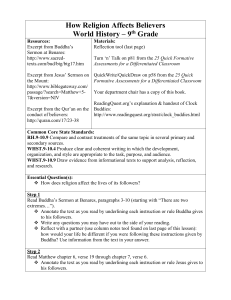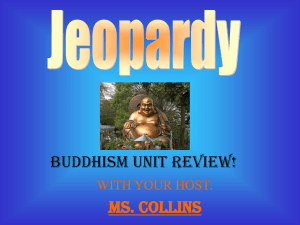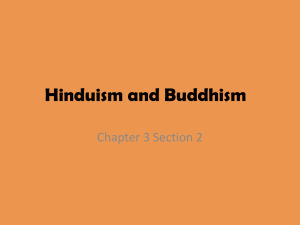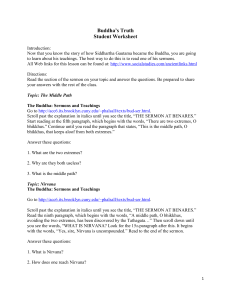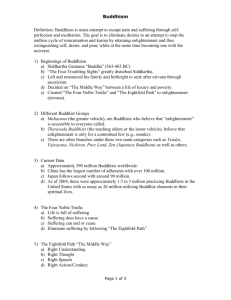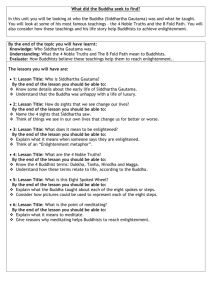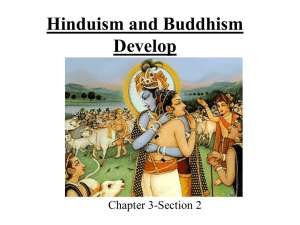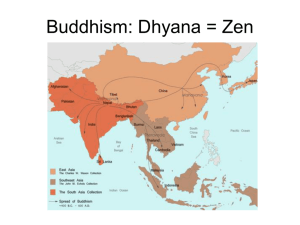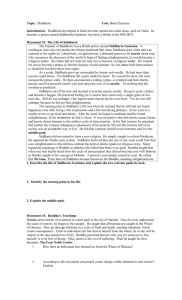Buddha teachings: Summary of Sermon at Benares
advertisement
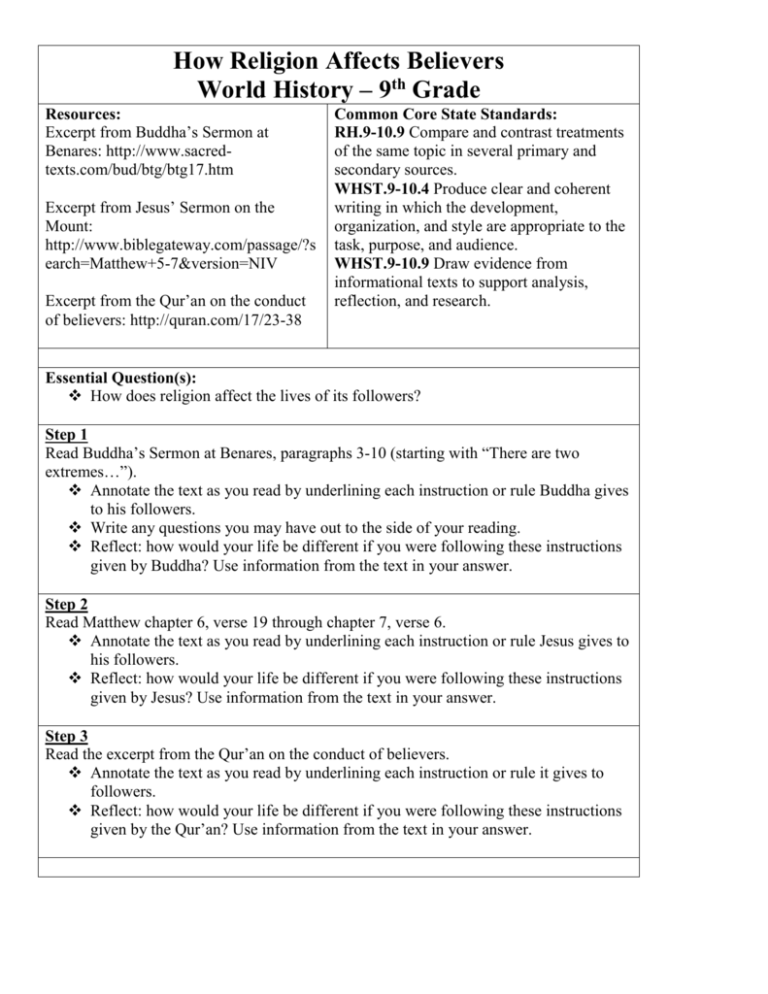
How Religion Affects Believers World History – 9th Grade Resources: Excerpt from Buddha’s Sermon at Benares: http://www.sacredtexts.com/bud/btg/btg17.htm Excerpt from Jesus’ Sermon on the Mount: http://www.biblegateway.com/passage/?s earch=Matthew+5-7&version=NIV Excerpt from the Qur’an on the conduct of believers: http://quran.com/17/23-38 Common Core State Standards: RH.9-10.9 Compare and contrast treatments of the same topic in several primary and secondary sources. WHST.9-10.4 Produce clear and coherent writing in which the development, organization, and style are appropriate to the task, purpose, and audience. WHST.9-10.9 Draw evidence from informational texts to support analysis, reflection, and research. Essential Question(s): How does religion affect the lives of its followers? Step 1 Read Buddha’s Sermon at Benares, paragraphs 3-10 (starting with “There are two extremes…”). Annotate the text as you read by underlining each instruction or rule Buddha gives to his followers. Write any questions you may have out to the side of your reading. Reflect: how would your life be different if you were following these instructions given by Buddha? Use information from the text in your answer. Step 2 Read Matthew chapter 6, verse 19 through chapter 7, verse 6. Annotate the text as you read by underlining each instruction or rule Jesus gives to his followers. Reflect: how would your life be different if you were following these instructions given by Jesus? Use information from the text in your answer. Step 3 Read the excerpt from the Qur’an on the conduct of believers. Annotate the text as you read by underlining each instruction or rule it gives to followers. Reflect: how would your life be different if you were following these instructions given by the Qur’an? Use information from the text in your answer. Reflection Tool How would your life be different if you followed the instructions given by…? Buddha Jesus Muhammad Thoughts from your partner? (1B-10th GradeDo not Complete) Text from the document to support your answer? Matthew 5: 38-48 Eye for Eye “You have heard that it was said, ‘Eye for eye, and tooth for tooth.’[h] 39 But I tell you, do not resist an evil person. If anyone slaps you on the right cheek, turn to them the other cheek also. 40 And if anyone wants to sue you and take your shirt, hand over your coat as well. 41 If anyone forces you to go one mile, go with them two miles. 42 Give to the one who asks you, and do not turn away from the one who wants to borrow from you. 38 Love for Enemies “You have heard that it was said, ‘Love your neighbor[i] and hate your enemy.’ 44 But I tell you, love your enemies and pray for those who persecute you, 45 that you may be children of your Father in heaven. He causes his sun to rise on the evil and the good, and sends rain on the righteous and the unrighteous. 46 If you love those who love you, what reward will you get? Are not even the tax collectors doing that? 47 And if you greet only your own people, what are you doing more than others? Do not even pagans do that? 48 Be perfect, therefore, as your heavenly Father is perfect. 43 Matthew 6: 1-4; Matthew 6: 19-24 Giving to the Needy 6 “Be careful not to practice your righteousness in front of others to be seen by them. If you do, you will have no reward from your Father in heaven. “So when you give to the needy, do not announce it with trumpets, as the hypocrites do in the synagogues and on the streets, to be honored by others. Truly I tell you, they have received their reward in full. 3 But when you give to the needy, do not let your left hand know what your right hand is doing, 4 so that your giving may be in secret. Then your Father, who sees what is done in secret, will reward you. 2 Treasures in Heaven “Do not store up for yourselves treasures on earth, where moths and vermin destroy, and where thieves break in and steal. 20 But store up for yourselves treasures in heaven, where moths and vermin do not destroy, and where thieves do not break in and steal. 21 For where your treasure is, there your heart will be also. 19 “The eye is the lamp of the body. If your eyes are healthy,[l] your whole body will be full of light. 23 But if your eyes are unhealthy,[m] your whole body will be full of darkness. If then the light within you is darkness, how great is that darkness! 22 “No one can serve two masters. Either you will hate the one and love the other, or you will be devoted to the one and despise the other. You cannot serve both God and money. 24 From the Qur’an: Rights and duties related to social justice: ‘O ye who believe! Be steadfast witnesses for God in equity, and let not hatred of any people seduce you that ye deal not justly. Deal justly, that is nearer to your duty. Observe your duty to God. Lo! God is Informed of what ye do.’ (5.8) "It is not righteousness that you turn your faces towards East or west; but it is righteousness to believe in God and the Day of Judgement and the Angels, and the Book, and the Messengers; to spend of your substance, out of love for Him, for your kin, for orphans. For the needy, for the wayfarer, for those who ask; and for the freeing of captives; to be steadfast in prayers, and practice regular poor due; to fulfil the contracts which you made; and to be firm and patient in suffering and adversity and throughout all periods of panic. Such are the people of truth, the God-conscious". (2:177) "And devour not each other’s property wrongfully unless it be through lawful trade and your mutual consent" (4:29) "And in no wise covet those things in which Allah has bestowed his gifts more freely on some of you than on others: to men is allotted what they earn and to women what they earn: but ask God of His bounty: for God has full knowledge of all things." (4:32) Rights and duties related to tyranny and oppression of others: "We (God) offered the Trust to the Heavens and the Earth and the Mountains: but they refused to undertake, it being afraid of it: but man undertook it. He has proved unjust and foolish." (33:72) "On the Day when every soul will come pleading for itself, and every soul will be repaid what it did, and they will not be wronged." (16.111 ) "Fight in the cause of God those who fight you but do not transgress limits; for God loveth not transgressors." (2:190) From Buddhism: Buddha teachings: Summary of Sermon at Benares One day, whilst sitting under a great, spreading, Bo tree Siddhartha Gautama felt that he was somehow undergoing profound, and extensive, alterations of realization and awakening. Siddhartha remained for seven days under the great tree. It is from this times that Siddhartha began to be referred to as the Buddha, a name implying his being Awake and Enlightened. These few days spent under the Bo tree are considered to have been the time of his Enlightenment. Buddha is said to have "attained Nirvana" - to have achieved a state where suffering is eliminated through the abandonment of desires - desires being the cause of suffering. Such attainment is held to bring release from an otherwise endless succession of reincarnations or rebirths. The term Nirvana has suggestive associations with a verb indicating cooling, or possibly, extinguishment!!! Considering himself to have made significant Spiritual Progress and that he now had some Buddha teachings that he thought important to share with others Siddhartha journeyed on foot over one hundred miles to Benares. Buddha's Enlightenment was experienced whilst living a life that was neither overly luxurious nor overly austere. His teachings were subsequently framed against an idea of a "Middle Way" that avoided such extremes. In a deer park he delivered the celebrated "The Sermon at Benares" in which are included two of the more central Buddha teachings i.e. the "Four Noble Truths" and the "Noble Eightfold Path". Primary Source Quote from Sermon at Benares: "He who fills his lamp with water will not dispel the darkness, and he who tries to light a fire with rotten wood will fail. And how can anyone be free from self by leading a wretched life, if he does not succeed in quenching the fires of lust, if he still hankers after either worldly or heavenly- pleasures. But he in whom self has become extinct is free from lust: he will desire neither worldly nor heavenly pleasures, and the satisfaction of his natural wants will not defile him. However, let him be moderate, let him eat and drink according to the needs of the body. “ The Four Noble truths The First Noble Truth is that old age, illness, and death are all forms of human suffering, and that there are many other ways in which people suffer. The Buddha accepted the Vedic idea of endlessly successive reincarnations where life followed upon life, with much suffering inevitably attending in each of these lives. The idea of Karma further suggesting that in each existence a person's good or bad deeds would respectively impact positively or negatively on their store of "merit". It was this Karma-merit that would underpin the advantageous, or pitiful, state into which individual reincarnations would occur. The Second Noble Truth is that suffering is closely linked to desire, a desire for being which leads from birth to death and involve ageing, illness, and mortality. There are also various desires for pleasures and for powers which, frustratingly, may not be realized. The Third Noble Truth is that suffering can be dispelled by the abandonment of all desires. The last of the Four Noble Truths holds that such abandonment of desires can be achieved by following the Noble Eightfold Path The Noble Eightfold Path Right Belief (in the Truth) Right Intent (to do good rather than evil) Right Speech (avoidance of untruth, slander and swearing) Right Behaviors (avoid blameworthy behaviors) Right Livelihood (some occupations e.g. butcher, publican, were disparaged!) Right Effort (towards the good) Right Contemplation (of the Truth) Right Concentration (will result from following the Noble Eightfold Path)



